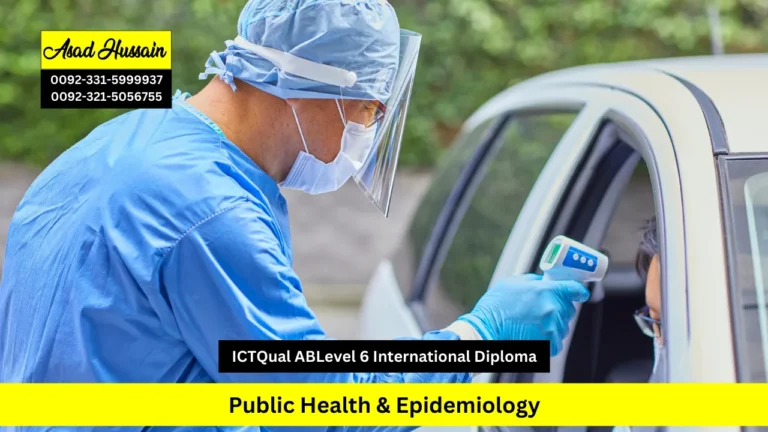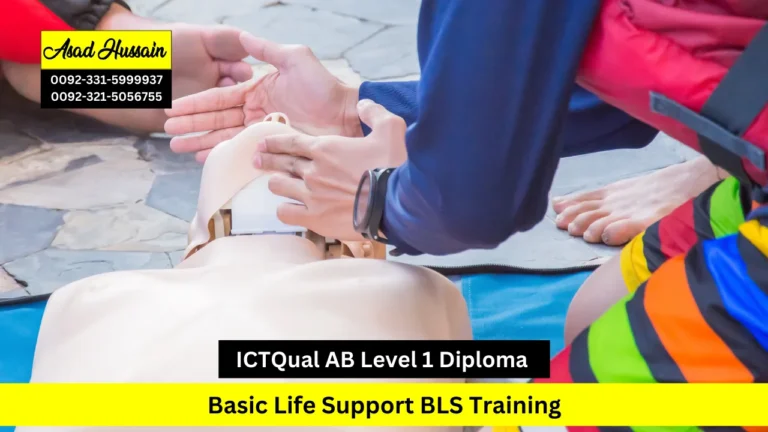Effective hospital and healthcare management is essential for delivering high-quality patient care, optimizing operational efficiency, and ensuring compliance with regulatory standards. The ICTQual AB Level 6 International Diploma in Hospital & Healthcare Management equips learners with advanced knowledge, strategic insights, and practical skills required to manage healthcare facilities successfully.
ICTQual AB Level 6 International Diploma in Hospital & Healthcare Management covers healthcare policies, hospital operations, resource management, quality assurance, financial planning, and leadership in clinical settings. Learners gain expertise in decision-making, staff management, patient safety, and performance evaluation, preparing them to handle the complex challenges of modern healthcare environments.
The course places a strong emphasis on practical applications, utilizing case studies, real-world simulations, and project-based learning to bridge the gap between theory and practice. Learners gain hands-on experience in implementing effective solutions for hospital administration, healthcare service delivery, resource management, and organizational decision-making. By engaging with realistic scenarios and challenges, participants develop critical thinking, problem-solving, and leadership skills essential for managing complex healthcare environments.
Upon successful completion of the ICTQual AB Level 6 International Diploma in Hospital & Healthcare Management, learners are awarded a British Council verifiable, MOFA and Embassy attestable certification, which is recognized internationally across healthcare and academic institutions. This globally recognized certification serves as formal validation of the learner’s advanced knowledge, practical skills, and competencies in hospital operations, healthcare leadership, strategic planning, and quality assurance.
Program Highlights
Study Units
Year 1: Foundation in Hospital & Healthcare Management
- Introduction to Psychology and Mental Health
- Human Development and Behaviour
- Fundamentals of Cognitive and Behavioural Psychology
- Introduction to Abnormal Psychology
- Principles of Counselling and Therapy
- Research Methods in Psychology
- Psychological Assessment Techniques
- Introduction to Neuropsychology
- Ethics and Professional Practice in Mental Health
- Communication Skills in Clinical Settings
- Health and Safety in Mental Health Environments
- Introduction to Stress and Coping Mechanisms
Year 2: Intermediate Hospital & Healthcare Management
- Strategic Planning and Decision-Making in Healthcare
- Advanced Healthcare Finance and Resource Management
- Human Resource Management in Hospitals
- Patient-Centred Care and Service Excellence
- Healthcare Operations and Logistics
- Risk Management and Compliance in Healthcare
- Project Management in Healthcare Settings
- Evidence-Based Practice in Healthcare Management
- Leadership Skills for Healthcare Professionals
- Healthcare Marketing and Communication Strategies
- Health Policy Analysis and Implementation
- Professional Development and CPD Planning
Year 3: Advanced Hospital & Healthcare Management
- Advanced Strategic Leadership in Healthcare
- Organisational Change and Innovation in Hospitals
- Advanced Healthcare Quality and Performance Improvement
- Healthcare Technology and Digital Transformation
- Financial Planning and Sustainability in Healthcare
- Crisis and Emergency Management in Healthcare
- Integrated Hospital and Clinical Services Management
- Advanced Project and Programme Management
- Healthcare Policy Development and Evaluation
- Research Project or Capstone in Healthcare Management
- Professional Ethics and Legal Considerations in Healthcare
- Advanced CPD and Career Development Strategies
To ensure learners are fully prepared for the Level 6 diploma, the program has specific entry requirements covering age, education, professional experience, and language proficiency.
Age Requirements
- Candidates must be 18 years or older at the time of enrollment.
- Mature learners with relevant managerial or healthcare experience may be considered.
Educational Requirements
- Completion of a Level 5 Diploma or equivalent in Healthcare Management, Hospital Administration, or a related field.
- Applicants with a bachelor’s degree in Healthcare, Nursing, Business Administration, or Public Health are eligible.
Professional Experience
- Minimum 1–2 years of experience in healthcare administration, hospital operations, or management roles is recommended.
- Practical exposure to healthcare systems, operational workflows, or clinical team coordination is advantageous.
English Language Proficiency
- Demonstrated English proficiency equivalent to IELTS 5.5 or higher.
- Ability to understand technical terminology, communicate effectively, and engage in academic learning is essential.
By meeting these entry requirements, learners are fully prepared to maximize their learning experience, develop strategic and operational skills, and advance their careers in hospital and healthcare management.
The ICTQual AB Level 6 International Diploma in Hospital & Healthcare Management equips learners with advanced knowledge, practical skills, and leadership capabilities in healthcare administration, hospital operations, and patient-centered management. The course emphasizes strategic planning, clinical governance, operational efficiency, and ethical healthcare practices, preparing learners to assume professional roles in hospitals, healthcare facilities, and medical management sectors.
Year 1: Foundation in Hospital & Healthcare Management
Introduction to Psychology and Mental Health
- Understand fundamental psychological principles and mental health concepts.
- Apply psychological knowledge to patient care and healthcare environments.
- Evaluate mental health cases using measurable assessment standards.
Human Development and Behaviour
- Analyze human development across the lifespan.
- Apply behavioural theories to healthcare practice.
- Assess patient needs using measurable developmental and behavioural indicators.
Fundamentals of Cognitive and Behavioural Psychology
- Apply cognitive and behavioural theories in clinical settings.
- Develop interventions based on evidence-based psychological principles.
- Measure effectiveness of interventions using established standards.
Introduction to Abnormal Psychology
- Identify and categorize common psychological disorders.
- Apply diagnostic criteria to clinical scenarios.
- Evaluate treatment approaches using measurable clinical outcomes.
Principles of Counselling and Therapy
- Apply basic counselling techniques in healthcare environments.
- Demonstrate therapeutic communication with patients.
- Assess counselling outcomes using measurable effectiveness criteria.
Research Methods in Psychology
- Understand research design, methodology, and data collection in healthcare studies.
- Apply research methods to practical healthcare projects.
- Evaluate research quality using measurable validity and reliability standards.
Psychological Assessment Techniques
- Conduct basic psychological assessments for patient evaluation.
- Apply standardized tools and techniques.
- Measure assessment accuracy and reliability against established benchmarks.
Introduction to Neuropsychology
- Understand brain-behaviour relationships in clinical contexts.
- Apply neuropsychological principles in patient care.
- Evaluate neuropsychological outcomes using measurable clinical indicators.
Ethics and Professional Practice in Mental Health
- Apply ethical principles in clinical decision-making.
- Demonstrate professional conduct in healthcare settings.
- Assess compliance with ethical and legal standards using measurable benchmarks.
Communication Skills in Clinical Settings
- Apply effective communication techniques with patients and healthcare teams.
- Demonstrate active listening, empathy, and professional dialogue.
- Evaluate communication effectiveness using measurable patient and team feedback.
Health and Safety in Mental Health Environments
- Apply safety protocols in clinical and hospital settings.
- Identify hazards and implement mitigation strategies.
- Assess safety compliance using measurable health and safety standards.
Introduction to Stress and Coping Mechanisms
- Understand psychological and physiological aspects of stress.
- Apply coping strategies for patients and staff.
- Evaluate intervention outcomes using measurable indicators.
Year 2: Intermediate Hospital & Healthcare Management
Strategic Planning and Decision-Making in Healthcare
- Develop strategic plans for healthcare operations.
- Apply decision-making frameworks in hospital management.
- Evaluate plan effectiveness using measurable KPIs.
Advanced Healthcare Finance and Resource Management
- Apply financial management principles to healthcare operations.
- Allocate resources efficiently to optimize service delivery.
- Assess financial performance using measurable metrics.
Human Resource Management in Hospitals
- Apply HR strategies to recruit, train, and retain healthcare staff.
- Implement workforce planning and performance management systems.
- Evaluate HR outcomes using measurable workforce metrics.
Patient-Centred Care and Service Excellence
- Implement patient-focused care models.
- Enhance service delivery through quality improvement initiatives.
- Measure patient satisfaction and care effectiveness using measurable standards.
Healthcare Operations and Logistics
- Manage day-to-day hospital operations efficiently.
- Apply logistics and workflow optimization strategies.
- Evaluate operational effectiveness using measurable KPIs.
Risk Management and Compliance in Healthcare
- Identify clinical and operational risks.
- Apply risk mitigation strategies and compliance protocols.
- Measure risk management effectiveness using established benchmarks.
Project Management in Healthcare Settings
- Plan, execute, and monitor healthcare projects.
- Apply project management methodologies for hospital initiatives.
- Evaluate project success using measurable performance criteria.
Evidence-Based Practice in Healthcare Management
- Apply research findings to improve healthcare practices.
- Develop evidence-based policies and protocols.
- Assess outcomes using measurable evidence-based standards.
Leadership Skills for Healthcare Professionals
- Develop leadership capabilities for clinical and administrative settings.
- Apply team management and motivational strategies.
- Measure leadership effectiveness using performance metrics.
Healthcare Marketing and Communication Strategies
- Apply marketing and communication techniques in healthcare contexts.
- Promote hospital services and community health initiatives.
- Evaluate campaign effectiveness using measurable performance indicators.
Health Policy Analysis and Implementation
- Analyze local and international healthcare policies.
- Apply policy frameworks to operational planning.
- Measure policy implementation success using measurable standards.
Professional Development and CPD Planning
- Plan continuing professional development (CPD) strategies.
- Apply learning to enhance career progression.
- Evaluate CPD effectiveness using measurable skill improvements.
Year 3: Advanced Hospital & Healthcare Management
Advanced Strategic Leadership in Healthcare
- Develop and implement advanced strategic leadership initiatives.
- Apply decision-making frameworks for hospital-wide impact.
- Measure leadership success using key performance metrics.
Organisational Change and Innovation in Hospitals
- Lead change management initiatives in clinical and administrative settings.
- Apply innovation strategies to improve healthcare delivery.
- Evaluate change effectiveness using measurable outcomes.
Advanced Healthcare Quality and Performance Improvement
- Implement advanced quality improvement programs.
- Apply performance measurement tools for healthcare excellence.
- Assess outcomes using measurable standards of care.
Healthcare Technology and Digital Transformation
- Integrate digital health solutions in hospital management.
- Apply technology for operational efficiency and patient care improvement.
- Evaluate technology impact using measurable KPIs.
Financial Planning and Sustainability in Healthcare
- Apply advanced financial planning strategies.
- Ensure sustainable resource allocation and budget optimization.
- Measure financial performance using measurable financial indicators.
Crisis and Emergency Management in Healthcare
- Develop and implement crisis response plans.
- Apply emergency management protocols in healthcare settings.
- Evaluate response effectiveness using measurable benchmarks.
Integrated Hospital and Clinical Services Management
- Coordinate multi-department hospital operations.
- Apply integration strategies for clinical and administrative functions.
- Assess service delivery efficiency using measurable standards.
Advanced Project and Programme Management
- Plan, manage, and evaluate large-scale healthcare projects.
- Apply project management tools to optimize outcomes.
- Evaluate project success using measurable KPIs and deliverables.
Healthcare Policy Development and Evaluation
- Develop and assess healthcare policies and strategies.
- Apply evaluation frameworks to measure policy effectiveness.
- Assess impact using measurable performance indicators.
Research Project or Capstone in Healthcare Management
- Conduct independent research addressing healthcare management challenges.
- Apply research findings to practical hospital scenarios.
- Evaluate project quality using measurable academic and operational standards.
Professional Ethics and Legal Considerations in Healthcare
- Apply ethical principles and legal compliance in clinical and administrative decisions.
- Evaluate ethical decision-making using measurable professional standards.
Advanced CPD and Career Development Strategies
- Develop career progression plans and CPD strategies.
- Apply learning to enhance professional skills and leadership.
- Evaluate career development success using measurable performance outcomes.
Upon completion, learners will be equipped with advanced strategic, operational, and leadership skills to manage hospitals and healthcare institutions efficiently, implement patient-centered solutions, and contribute to high-quality healthcare delivery in complex environments.
The ICTQual AB Level 6 International Diploma in Hospital & Healthcare Management is designed for individuals seeking advanced knowledge, strategic insights, and practical skills to manage hospitals, clinics, and healthcare organizations effectively. This program is ideal for a wide spectrum of learners who aim to enhance leadership, operational, and administrative capabilities while contributing to the delivery of high-quality healthcare services.
1. Educational Instructors and Trainers
- Aim to expand their expertise in healthcare management to deliver advanced training and academic programs.
- Integrate practical hospital management strategies, case studies, and evidence-based practices into their teaching curriculum.
2. Environmental Advocates and Activists
- Interested in understanding sustainable practices within healthcare facilities and hospitals.
- Aim to promote eco-friendly operations, waste management, and energy-efficient healthcare initiatives.
3. Students and Recent Graduates
- Looking to gain specialized knowledge and hands-on skills in hospital administration and healthcare management.
- Desire practical exposure to operational workflows, leadership strategies, and quality assurance practices to enhance employability.
4. Career Changers
- Professionals transitioning from other industries into healthcare management or hospital administration roles.
- Seek structured, internationally recognized certification, strategic management skills, and practical experience to establish credibility in their new career path.
5. Policy Makers and Regulators
- Aim to acquire a deep understanding of hospital operations, healthcare regulations, and patient safety standards.
- Use this knowledge to develop, implement, and evaluate policies that ensure ethical, efficient, and high-quality healthcare delivery.
By catering to educators, students, career changers, environmental advocates, and policy makers, the ICTQual AB Level 6 International Diploma in Hospital & Healthcare Management prepares graduates to excel in diverse managerial roles, improve healthcare delivery, and contribute meaningfully to the advancement of hospital and healthcare systems globally.







